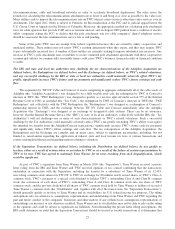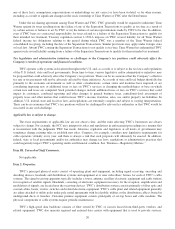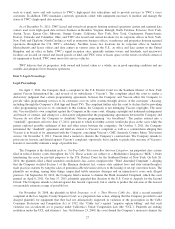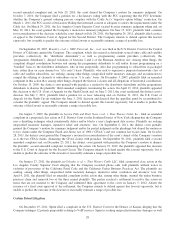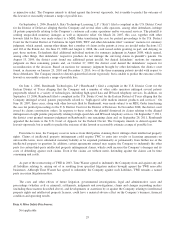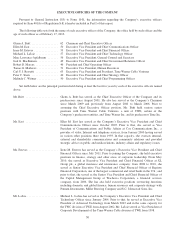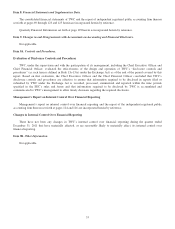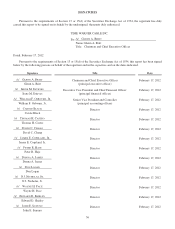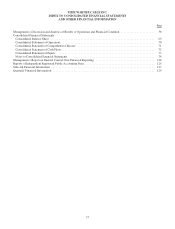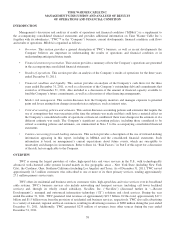Time Warner Cable 2011 Annual Report Download - page 36
Download and view the complete annual report
Please find page 36 of the 2011 Time Warner Cable annual report below. You can navigate through the pages in the report by either clicking on the pages listed below, or by using the keyword search tool below to find specific information within the annual report.second amended complaint and, on July 29, 2010, the court denied the Company’s motion for summary judgment. On
October 7, 2010, the Company filed a petition for a declaratory ruling with the FCC requesting that the FCC determine
whether the Company’s general ordering process complies with the Cable Act’s “negative option billing” restriction. On
March 1, 2011, the FCC issued a Declaratory Ruling that informed consent is adequate to satisfy the requirements under the
Cable Act. On March 29, 2011, the Los Angeles County Superior Court vacated its prior summary judgment ruling and, on
May 12, 2011, the court granted the Company’s motion for summary judgment. On June 13, 2011, plaintiffs filed a motion
for reconsideration of the decision, which the court denied on July 28, 2011. On September 26, 2011, plaintiffs filed a notice
of appeal to the California Court of Appeal for the Second District. The Company intends to defend against this lawsuit
vigorously, but is unable to predict the outcome of this lawsuit or reasonably estimate a range of possible loss.
On September 20, 2007, Brantley, et al. v. NBC Universal, Inc., et al. was filed in the U.S. District Court for the Central
District of California against the Company. The complaint, which also named as defendants several other cable and satellite
providers (collectively, the “distributor defendants”) as well as programming content providers (collectively, the
“programmer defendants”), alleged violations of Sections 1 and 2 of the Sherman Antitrust Act. Among other things, the
complaint alleged coordination between and among the programmer defendants to sell and/or license programming on a
“bundled” basis to the distributor defendants, who in turn purportedly offer that programming to subscribers in packaged
tiers, rather than on a per channel (or “à la carte”) basis. Plaintiffs, who seek to represent a purported nationwide class of
cable and satellite subscribers, are seeking, among other things, unspecified treble monetary damages and an injunction to
compel the offering of channels to subscribers on an “à la carte” basis. On December 3, 2007, plaintiffs filed an amended
complaint in this action that, among other things, dropped the Section 2 claims and all allegations of horizontal coordination.
On October 15, 2009, the district court granted with prejudice a motion by the distributor defendants and the programmer
defendants to dismiss the plaintiffs’ third amended complaint, terminating the action. On April 19, 2010, plaintiffs appealed
this decision to the U.S. Court of Appeals for the Ninth Circuit and, on June 3, 2011, the court reaffirmed the district court’s
decision. On July 7, 2011, plaintiffs filed a petition for en banc rehearing and, on October 31, 2011, the U.S. Court of
Appeals for the Ninth Circuit withdrew the June 3, 2011 decision and directed that the appellate panel be reconstituted to
consider the plaintiffs’ appeal. The Company intends to defend against this lawsuit vigorously, but is unable to predict the
outcome of this lawsuit or reasonably estimate a range of possible loss.
On August 7, 2009, the plaintiffs in Jessica Fink and Brett Noia, et al. v. Time Warner Cable Inc., filed an amended
complaint in a purported class action in U.S. District Court for the Southern District of New York alleging that the Company
uses a throttling technique which intentionally delays and/or blocks a user’s high-speed data service. Plaintiffs are seeking
unspecified monetary damages, injunctive relief and attorneys’ fees. On September 6, 2011, the district court partially
granted the Company’s motion for summary judgment and/or for partial judgment on the pleadings, but denied the motion as
to two claims under the Computer Fraud and Abuse Act of 1986 (“CFAA”) and one common law fraud claim. On October
28, 2011, the district court granted the Company’s motion for reconsideration of the court’s denial of the Company’s motion
as to the two CFAA claims, dismissing the CFAA claims with prejudice. On September 30, 2011, plaintiffs filed a second
amended complaint and, on December 23, 2011, the district court granted with prejudice the Company’s motion to dismiss
the plaintiffs’ second amended complaint, terminating the action. On January 23, 2012, the plaintiffs appealed this decision
to the U.S. Court of Appeals for the Second Circuit. The Company intends to defend against this lawsuit vigorously, but is
unable to predict the outcome of this lawsuit or reasonably estimate a range of possible loss.
On January 27, 2011, the plaintiffs in Calzada, et al. v. Time Warner Cable LLC, filed a purported class action in the
Los Angeles County Superior Court alleging that the Company recorded phone calls with plaintiffs without notice in
violation of provisions of the California Penal Code and the California Unfair Business Practices Act. The plaintiffs are
seeking, among other things, unspecified treble monetary damages, injunctive relief, restitution and attorneys’ fees. On
April 4, 2011, the plaintiff filed an amended complaint in this action that, among other things, omitted the unfair business
practices claim and removed two of the three named plaintiffs. The parties reached a settlement to resolve this action on
terms that are not material to the Company and submitted their agreement to the court on January 5, 2012. Absent the
issuance of a final court approval of the settlement, the Company intends to defend against this lawsuit vigorously, but is
unable to predict the outcome of this lawsuit or reasonably estimate a range of possible loss.
Certain Patent Litigation
On December 19, 2011, Sprint filed a complaint in the U.S. District Court for the District of Kansas alleging that the
Company infringes 12 patents purportedly relating to VoIP services. Sprint is seeking unspecified monetary damages as well
28









